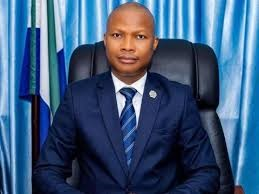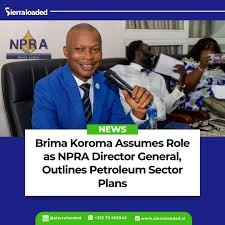The Director of Communications at State House, Mykee Berewa, has provided a synopsis analysis of acheivements at the office of the National Petroleum Regulatory Authority headed by Brima Baluwa Koroma.
Berewa, in an interviewed with Liberty TV Online Radio, explained that if you go back to the operational years to crucially look at the operations of the Petroleum Regulatory Authority (now National Petroleum Regulatory Authority), there are evidence to show that significant impacts and progress have been made, hence the need to appreciate and celebrate the good work of the NPRA Boss.


In recent years, the National Petroleum Regulatory Authority (NPRA) has emerged as a spotlight of success under the stewardship of Brima Baluwa Koroma, marking a very important transformation in Sierra Leone’s petroleum sector. The Authority, which has been pivotal in reshaping the country’s approach to fuel supply and regulation, exemplifies the positive changes initiated by the current Bio Administration. Where once there were widespread reports of petroleum shortages that plagued the nation, today, Sierra Leone can proudly claim stability in its petroleum products, thanks to effective leadership and strategic reforms.
The achievements of the NPRA have not gone unnoticed. Ordinary citizens, alongside government officials, are lauding the institution for the substantial progress made in ensuring a continuous supply of petroleum products. This sentiment was recently echoed by Myke Berewa, the Director of Communication at State House. While discussing President Bio’s accomplishments, Berewa emphasized that the government has successfully stabilized petroleum products, in stark contrast to the previous turmoil experienced in this vital sector.
Prior to Brima Baluwa Koroma’s appointment to lead the NPRA, the petroleum landscape in Sierra Leone was characterized by monopolistic control and recurrent man-made fuel shortages. This situation created hardships for everyday citizens and businesses reliant on consistent fuel availability. However, under Koroma’s guidance, significant legislative measures have been instituted, altering the narrative from one of scarcity to one of sustainability. As Berewa noted, “When President Bio appointed Brima Baluwa Koroma to head the NPRA, he succeeded in making legislation that has changed the narrative from a nation known for fuel shortage to a state that can now proudly talk about proper petroleum product storage of at least three months.”
This is a remarkable achievement, when considering that before the establishment of these new regulations, the country struggled with inadequate storage capabilities, often only able to manage a few weeks’ supply. Now, with enhanced storage facilities capable of meeting demand for several months, Sierra Leone is better equipped to handle fluctuations in petroleum supply. Berewa described this progress as a stabilizing force, noting, “Today, the country stands on stable and comfortable storage facilities.”
Moreover, the increased competition among petroleum product dealers has further improved access to fuel across the nation. The NPRA’s reforms have attracted more dealers into the market, leading to greater availability of petroleum products than ever before. Berewa pointed out that this competition has empowered dealers to adjust prices more freely, reflecting market conditions rather than being strictly regulated by a few entities. “Because there is competition in the petroleum market today, petroleum product dealers have decided to reduce prices for their products at will, with the guidance of the leadership of the NPRA,” he stated. Such flexibility in pricing is unprecedented in Sierra Leone’s history, and underscores the transformative impact of the current administration’s policies.
The positive effects of Brima Baluwa Koroma’s leadership extend beyond just fuel availability and pricing; they encapsulate a broader vision of transforming public institutions for the benefit of the populace. Berewa concluded his remarks by affirming President Bio’s commitment to appointing capable leaders like Koroma to lead public institutions, thereby yielding significant results for the people of Sierra Leone.
As the nation continues to navigate its path forward, the achievements of the NPRA under Koroma’s leadership stand as a testament to the potential for reform and development within Sierra Leone’s public sector. With the lessons learned and the momentum gained, it is evident that the NPRA has set a new standard for governance, accountability, and service delivery in the petroleum industry—an example that can inspire further advancements in other sectors of the economy.